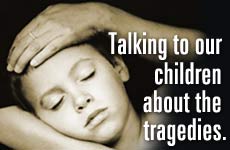 Iran’s Attack on Israel
Iran’s Attack on Israel


4 min read
Our children are looking to us for calm and compassion, faith and hope.
Our children look to us for their perceptions of the world. They look to us for guidance and understanding, to answer their questions, and to help them at times verbalize their questions. But mostly they look to us for reassurance -- reassurance that their world is okay, that they are safe, that while the stories they are hearing and the images they are seeing are terrible and incredibly sad, they are still safe.
When traumatic events occur, what we say to them is important. It is perhaps even more important how we say it. They watch our reactions; they look to see if we're frightened. Fear and panic is contagious even among adults; it is essential that we send out an aura of calm. Calm parents communicate reassurance.
As always, it is important to know your children and the different needs of each child. For younger children, under 8, focus less on details and more on general points. Older children need more information. For them, information is important in helping to process the trauma, and they may need to talk about it a lot. Be patient. We need to listen to them, and listen more. Children that are less verbal will still be listening though to the other conversations taking place in the family about the event. Include these children by talking near them. Give lots of love and gentleness, even with children who are difficult. Remember they are anxious and feeling stress.
It is our parental responsibility to ensure and protect the sensitive psyche of our child.
Parents though must filter the amount and the nature of the information. It is our parental responsibility to ensure and protect the sensitive psyche of our child. The less visual the images, the better. Young children should not see any images at all. No TV and no Internet images. They are detrimental and can be traumatic. It is not at all the same as watching a movie, even a horror movie. In movies there is always the underlying comfort that this isn't real, that it will end and have no effect on their lives. Watching actual tragedies may be moving, even compelling, but increase anxiety and are harmful for children. They are probably not particularly healthy for adults either.
Our children look to us and need to see that we are okay. They look for other reactions as well. They should see sadness and compassion on our faces for the victims and their families and friends. We can use this opportunity to talk to our children about the many heroes, the less dramatic stories and the more dramatic ones, the rescue workers, the small acts of kindness, the gentleness, and self-sacrifice of simple people. They need to hear about goodness as the way to counteract evil, and about reaching out to others and feeling their pain.
And they need to hear about God from you as well. Ideas that can include the following:
Our children are looking to us for calm, compassion, love, faith, and hope. Let's be sure we give it.
